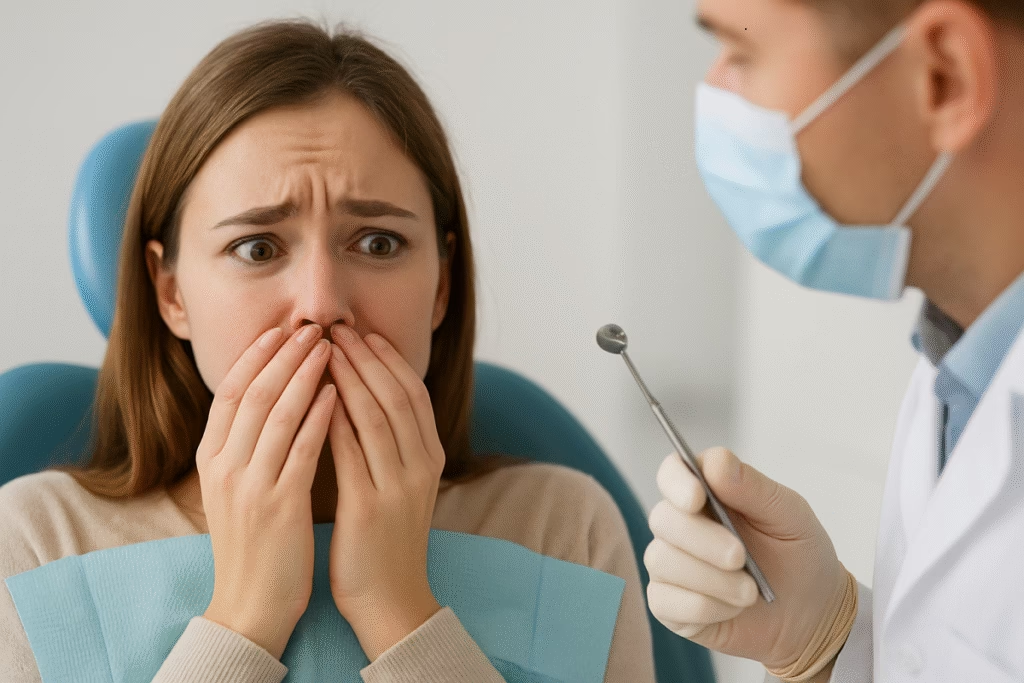Introduction
For many people, the thought of visiting a dentist brings feelings of worry, nervousness, or even panic. This is known as dental anxiety—a common condition that prevents millions from receiving the care they need. While skipping dental visits may feel easier in the moment, it can lead to serious oral health problems in the long run.
In this article, we’ll explore the causes of dental anxiety, how it affects oral health, and proven tips to overcome the fear of the dentist.
What is Dental Anxiety?
Dental anxiety refers to fear, stress, or nervousness associated with visiting the dentist. It may range from mild uneasiness to severe phobia (also called dental phobia or odontophobia).
Unlike normal nervousness, dental phobia can cause people to completely avoid dental treatment, even when they are in pain.
Causes of Dental Anxiety
1. Past Negative Experiences
- Painful or uncomfortable dental visits in childhood or adulthood.
- Feeling helpless in the dental chair.
2. Fear of Pain
- Many people expect dental procedures to hurt, even though modern dentistry uses anesthesia and pain-free methods.
3. Embarrassment
- Some patients feel self-conscious about the condition of their teeth or bad breath.
4. Loss of Control
- Being unable to talk or move during treatment can trigger anxiety.
5. Fear of Injections or Drills
- Needles, drills, and dental instruments can provoke fear in anxious patients.
How Dental Anxiety Affects Oral Health
- Avoidance of care: Patients skip routine checkups.
- Worsening problems: Minor cavities can turn into severe tooth decay or infections.
- Higher treatment costs: Delayed care often leads to complex, expensive procedures.
- Impact on overall health: Gum disease is linked to heart disease, diabetes, and other systemic conditions.
Recognizing Signs of Dental Anxiety
You may have dental anxiety if you experience:
- Trouble sleeping before a dental appointment.
- Nervousness or sweating while waiting at the clinic.
- Racing heartbeat during dental procedures.
- Difficulty breathing or feeling panicked in the chair.
Tips to Overcome Fear of the Dentist
1. Communicate with Your Dentist
- Share your concerns openly.
- Ask the dentist to explain each step before starting.
- Agree on a “stop signal” (like raising your hand) if you feel uncomfortable.
2. Choose the Right Dental Clinic
- Look for a dentist experienced in treating anxious patients.
- Clinics with a calm environment and friendly staff can make a big difference.
3. Bring a Friend or Family Member
- Having someone you trust beside you can provide reassurance.
4. Practice Relaxation Techniques
- Deep breathing exercises.
- Meditation or listening to calming music before the visit.
5. Distraction During Treatment
- Use headphones to listen to music or audiobooks.
- Watch videos if the clinic provides screens.
6. Consider Sedation Dentistry
- Options include nitrous oxide (laughing gas), oral sedatives, or IV sedation for more complex procedures.
- Always consult your dentist about safety.
7. Take Small Steps
- Start with a consultation or cleaning before moving to bigger treatments.
- Gradual exposure helps reduce fear over time.
Helping Children with Dental Anxiety
- Introduce dental visits early (by age 1 or after the first tooth erupts).
- Use positive language (“the dentist will count your teeth” instead of “it won’t hurt”).
- Role play at home using toys or storybooks about dental visits.
- Reward bravery with praise or a small treat afterward.
When to Seek Professional Help
If dental anxiety is severe and prevents necessary treatment, professional counseling or cognitive behavioral therapy (CBT) can help patients manage their fears effectively.
Conclusion
Dental anxiety is common, but it doesn’t have to stop you from maintaining good oral health. With open communication, relaxation techniques, and supportive dental care, anyone can overcome the fear of the dentist.
👉 Remember: Regular checkups are the best way to prevent serious dental problems and keep your smile healthy for life.
FAQs
Q1: Is dental anxiety common?
Yes, nearly 1 in 5 people experience some level of dental anxiety.
Q2: Can dentists help with dental phobia?
Absolutely. Many dentists specialize in treating anxious patients with gentle techniques and sedation options.
Q3: What is the difference between dental anxiety and dental phobia?
Dental anxiety is nervousness or worry, while dental phobia is a severe fear that prevents dental visits altogether.
Q4: Can dental anxiety affect children?
Yes. Early positive dental experiences are crucial to prevent lifelong dental fear.
Q5: What’s the safest way to manage severe dental anxiety?
A combination of relaxation, sedation dentistry, and counseling (CBT) is most effective.
